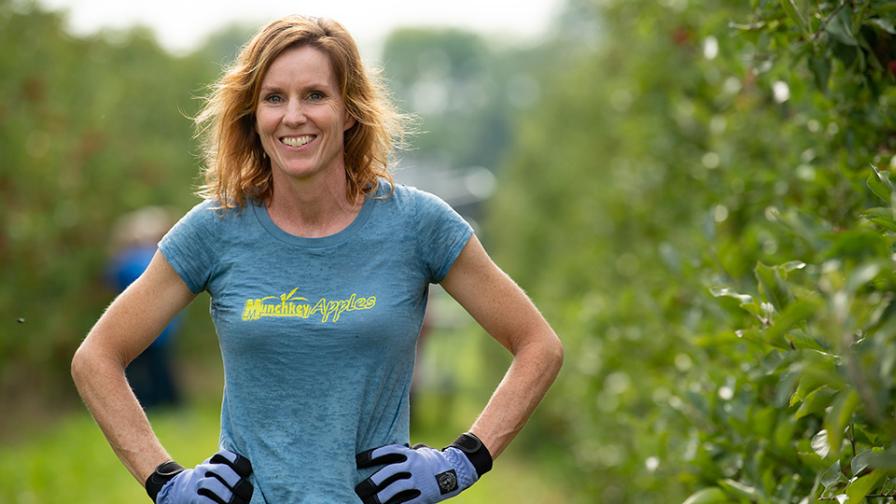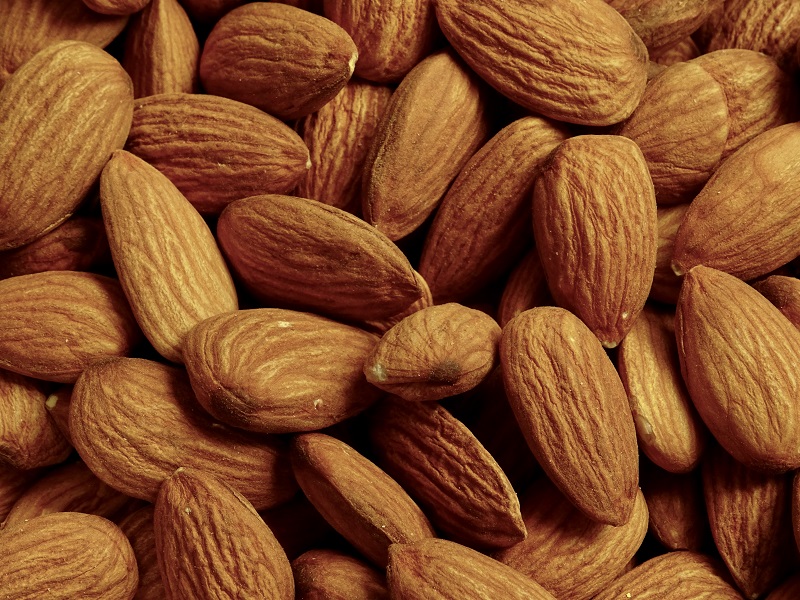Big Responsibility Is Nothing New for This Busy Apple Grower

Meet Laura Tisch of Munchkey Apples. She is this year’s Apple Grower of the Year Midwest Region Honoree. Tending to her family and beef cattle hasn’t stopped Tisch from growing 9,000 apple trees.
Photo courtesy of Munchkey Apples
Laura Tisch grew up on a dairy farm, studied chemistry at the University of Wisconsin-River Falls, focused on drug development the first seven years of her career, and then became a full-time mother of five.
Naturally, she now grows apples for a living.
“I just wanted a nice little home in the country with some beef cattle. So, we started with our beef operation,” Tisch says. “I didn’t want to have our eggs in one basket, so I’m the one who said, ‘How about an apple orchard?’ I really don’t know where that came from. I was never the person who had gone and experienced apple orchards.”
While the origin of her epiphany is iffy, the outcome is much clearer. Tisch, 52, has fast-tracked into one of the rising apple growers in the Midwest and serves as a solid example of female entrepreneurship in the field.
“I just wanted to do something good, and I’m like, ‘Apples are good for people,’” Tisch says.
START FROM SCRATCH
The switch to apple growing occurred in March of 2011, when Tisch attended a four-day commercial apple growers’ course at the University of Wisconsin-Madison.
“I remember asking her when she finished the course, ‘Can we make money growing apples?’” Tisch’s husband Brad says. “Her reply was, ‘Yes, but I don’t know if I can do this. There’s a lot more to this than you realize.’”
Nonetheless, Laura planted 500 trees that spring, and that was the start of Munchkey Apples in Mount Horeb, WI.
The name “Munchkey” honors the Tisch’s youngest child.
“I had always called her my little munchkey, and she was 3 years old when we planted our first trees,” Laura says. “I know so many people name their orchards after their family name, but that’s what we named ours after.”
Eleven years later the orchard consists of approximately 9,000 trees, primarily ‘Honeycrisp’.
“I’m still a mom here and still have the beef cattle and, yeah, that’s enough for me,” Tisch says.
But make no mistake, Tisch is employing many innovative growing and marketing practices, as the savviest growers focus on the end sale. Most of the trees are managed in a tall spindle high-density system. Other initiatives at Munchkey include:
• Installation of multiple weather systems to monitor disease and insect models
• Mating disruption
• Hedging
• Frost protection via wind tower/frost fan
• Investment in a Munckhof apple harvesting platform
• Partnership with Brix Cider
• Addition of a commercial kitchen
The most difficult aspect of running a small orchard, Tisch says, is having to assume most of the tasks, which includes marketing 70% of Munchkey’s apples to grocery stores and the remainder through its farm store and pick-your-own operation.
“I can’t stand doing social media,” she says. “But you know you have to do the marketing, and then you’re doing the growing, and then I’m the one who’s selling it, and I’m the one who got the bakery going. So, it’s just tough wearing all those hats and never getting a break.”
MAJOR MENTOR
Laura Tisch credits much of her success to veteran Wisconsin apple grower Bob Barthel, one of her three instructors at the commercial apple growers’ course. Now retired, Barthel encouraged Tisch to join the International Fruit Tree Association (IFTA) and Wisconsin Apple Growers Association (WAGA). She has since served a term as WAGA president and has instructed at the same growers’ course where she got her start.
“I would say he’s my godsend — or maybe that I’m in this predicament because of him,” Tisch laughs.
As for carrying the load for fellow female apple growers, Tisch downplays her role as an ambassador.
“I grew up on a dairy farm where my dad had three daughters, and then he finally had a son, and before he had his son he put on the barn ‘Tom Esch and Daughters.’ He always treated his girls the same. So, I’ve never ever had the thought, ‘Well, I’m a girl, I can’t do that.’ I just did what I wanted to do, and I’ve never had anybody stop me from doing what I wanted to do. So, if I am a role model for women, it’s not that I tried to be.”










